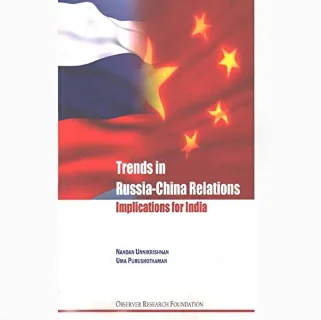In a rapidly-changing world where new powers and fresh alliances are emerging, Russia-China relations will form a key component in determining the evolution of the balance of power in the world.
There is increasing convergence between Russia and China on several global issues. Moscow and Beijing openly coordinate positions on these issues, particularly in the UN Security Council. They are also engaged in multilateral fora such as RIC, SCO, and BRICS, and see such an engagement as one way of strengthening a multipolar world in which they are key players as well as a platform to present an alternative viewpoint to the Western-dominated global discourse.
At the same time, the so-called “China threat” plays an important role in Russia’s foreign and defence policies. Russia actively develops its Eastern Military District, supplying it with new weapons and troops, and holds military exercises every year to practice the redeployment of troops to the Russian Far East from the European part of Russia. Similarly, the counterpart “Russia threat” plays a role in China’s foreign and defence policies: the Chinese military conducts exercises simulating an invasion of Russia with its troops marching 1,000 kilometres to test the army’s long-range projection capacity.
Russia knows that despite its superiority in terms of nuclear weapons, its conventional forces are no match to China’s military. China, on the other hand, fears being encircled and isolated if Russia joins the West.
Moscow and Beijing realise that the political systems in both countries are transitional in nature although similar in terms of systems governed by self-perpetuating elites. Therefore, there is always the possibility that both countries may change, thus transforming the nature of a China/Russia threat: from what is currently hypothetical to a real one. This would have terrible potential consequences for both countries.
It is to avoid the possibility of such a confrontation that the leaders of both countries are trying to bind their nations together through a web of military, economic, energy, and social ties.
Beijing and Moscow have been re-invigorating their military cooperation through arms sales (China acquired $2 billion worth of Russian arms between 2011 and 2012) as well as through regular joint military exercises (bilateral as well as multilateral) and exchange of experts.
For example, during Chinese President Xi Jinping’s recent visit to Russia, it was widely reported in the Chinese media that Russia had agreed to sell China some 24 Su-35 multirole fighter jets and four Amur-class diesel submarines. This is a higher level of technology than supplied before, indicating a change in Russia’s attitude towards transfer of technology to China, given Moscow’s fears of it being reverse engineered.
Economic relations are portrayed as the “new strategic basis” for Sino-Russian relations. China is Russia’s biggest trading partner and the largest Asian investor in Russia. China sees Russia as a powerhouse of raw material and a growing market for its consumer goods.
While Russia exports natural resources, China supplies manufactured goods. This imbalance in the structure of trade is beginning to worry Russia. Russia’s long-term economic relationship with China also faces an existential conundrum. Russia needs financial resources and technology to restructure and modernise its economy to reduce its dependence on raw materials exports. However, the technologies it requires for this are available not with China, but in the West.
Sino-Russian energy relations have fallen short of their potential so far. The most important hurdles to greater energy cooperation in the decade 2000 to 2010, were Russia’s fear of a Chinese monopsony (fears of being dependent on one consumer of energy) as well as price disputes. Now the strategic reluctance on Russia’s part to sell energy to China is diminishing with the demand for Russian energy in Europe declining and the US likely to become a net exporter of gas and oil to Europe.
In the meantime, China has been trying to diversify its energy sources in Central Asia, West Asia and Africa, while also exploring the option of shale gas. Therefore, while Russia could become dependent on China as a market, it seems highly unlikely that China will become dependent on Russia for energy. Thus, Russia’s fears of a Chinese energy monopsony may yet materialise.
Russia and China have similar interests and priorities in Central Asia. Nevertheless, China’s increasing inroads into the region make Russia uncomfortable and could become a source of tension. So far, China appears to be sensitive to Russian concerns. In 2010, China and Russia issued a joint statement in which China acknowledged the post-Soviet region as an area of Russia’s special interests and expressed support for Russia’s endeavours to uphold its national interests and security in Central Asia. Another area of tension could be China’s recently espoused interest in the Arctic. However, even here, Beijing and Moscow have begun collaborating with each other.
Cooperation in the Russian Far East has the potential to be a game-changer in Sino-Russian relations if they are able to move towards joint development of the region. While Moscow realises the need to develop the Far East and integrate it with the Asia Pacific region, it faces a bigger dilemma: who should its partner/s be in developing the Far East? Should it be Japan? Or South Korea? Perhaps, China? Or all of them together? The answer to this question would point towards whom Russia would lean to, in the years ahead. There are fears in some circles in Russia of Chinese immigration, but these are being dismissed by most Russian and Chinese experts.
Despite Russia’s reluctance to be China’s “junior partner”, the apparent convergence at the political, strategic and economic levels appears to be transforming the bilateral relationship into a lasting partnership. However, a lot will depend on how each country’s ties with the US develop: for both countries, their most important bilateral relationship continues to be that with the US. If the US changes its policy towards Russia and embraces it, Russia might be tempted into risking its relations with China for a partnership with the US. China fears a rapprochement between the West and Russia would be against it. This currently appears unlikely, though. Another possibility is if the US and China move into a closer relationship. If this happens, Russia will be pushed to move closer into a strategic embrace, albeit an uncomfortable one, with China because of its fear of a G-2 between China and the US.
However, none of these differences are insurmountable given the current geostrategic goals of Russia and China. Post-Cold War Sino-Russian relations are a reflection of tactical pragmatism in both countries. As long as the glue binding Russia and China is their shared interest in balancing the US, we feel that for the next few years, China and Russia will remain close partners, creating all the necessary preconditions for transforming this tactical proximity into a strategic partnership.
This has obvious implications for India, which will find its strategic options increasingly constrained if a Sino-Russian strategic partnership emerges. In the event of Russia and China becoming closer to one another, India will have to either cooperate with Russia and China, or balance against them by drawing closer to the US.
If the growing relationship develops into a Russian dependency on China, then closer coordination between Russia and China in multilateral fora like BRICS, SCO, and RIC, would constrain India’s options.
If Russia starts supplying high technology to China in the military sphere, India’s security could be compromised. There is also the possibility of Russia growing closer to Pakistan because of China’s influence.
Therefore, it is important that India draw up strategies that protect its national interests, including the following:
- Deepen its relationship with Russia, because Russia is an important balancer for India vis-à-vis China;
- Within the framework of the excellent military relationship with Russia, India needs to impress upon Russia that it should not transfer technology to China that could prove to be detrimental to India’s security in the long run.
- Promote mutually beneficial trilateral cooperation between Russia, China and India that could contribute towards reduction of mistrust and suspicion between India and China;
- Similarly, pursue policies that will increase China’s dependency on India;
- Finally, develop closer ties with the United States aimed at developing a new trilateral—US-Russia-India—that could balance any moves towards a strategic partnership between China and Russia.
The views expressed above belong to the author(s). ORF research and analyses now available on Telegram! Click here to access our curated content — blogs, longforms and interviews.

 PDF Download
PDF Download



 PREV
PREV



